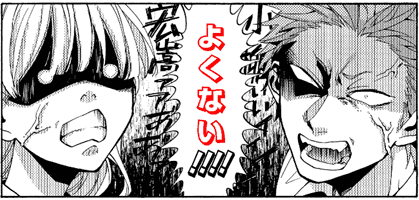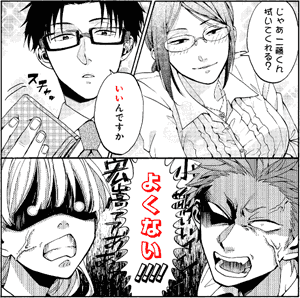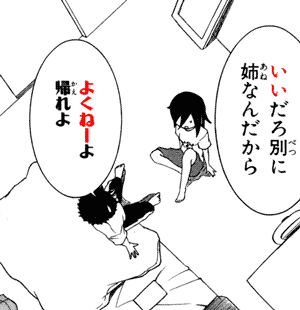Fortunately, there isn't much special about it. It's just the negative of ii いい.
The word yokunakatta よくなかった would be "was not good," past negative. Technically, both yokunai and yokunakatta are inflections of the i-adjective yoi よい, not of ii いい, but ii is never inflected, ii and yoi are synonymous, and ii is more common, so they're de facto inflections of ii.
Manga: Wotaku ni Koi wa Muzukashii ヲタクに恋は難しい (Chapter 5)
"Not Good"
The antonym of "good," ii いい, would be warui 悪い, "bad," but sometimes yokunai よくない, "not good," is used instead of warui. This can happen for a number of reasons:- When someone says something is "good," or there's an expectation it is, and you want to deny it, you say "no, it's not good," yokunai, instead of saying "it's bad," warui.
- When talking about people's behavior, saying what they're doing is "bad" straightforwardly is avoided, and so "not good" is used instead.
- The word yokunai may have a nuance of meaning "not alright [to do]" in some cases.
Manga: Wotaku ni Koi wa Muzukashii ヲタクに恋は難しい (Chapter 5)
- Context: Hanako 花子 spilled a drink on her shirt and doesn't have a handkerchief, but Nifuji 二藤 does. Coincidentally, their love interests are sitting across the table.
- jaa, Nifuji-kun
fuite-kureru?
じゃあ二藤くん拭いてくれる?
Then, [will you] wipe [for me], Nifuji-kun? - ii-n-desu ka
いいんですか
[Is that okay?]- ii いい
Literally "good," but can also mean "okay" in questions like this.
- ii いい
- yokunai!!!!
よくない!!!!
[Not it's not!!!!]
よくない vs. 悪い
The main difference between yokunai and warui is that, since yokunai is less direct, it's implicitly more polite, because you're avoiding a more direct statement, confrontation.There are some phrases that are generally only said with yokunai rather than with warui. These are mostly about something someone is doing that they shouldn't do. For example:
- *kenka wa warui
喧嘩は悪い
Fighting is bad. (nobody says this.) - kenka wa yokunai 喧嘩はよくない
Fighting isn't good.
Fighting isn't okay. Fighting isn't alright.
Fighting isn't [cool]. (or whatever.)
(guys, don't fight. Be friends!)
In some cases, yokunai and warui are interchangeable, but the choice between the softer yokunai and the heavier warui leaves some nuance. For example:
- taido ga warui 態度が悪い
Behavior is bad.
The way you behave is bad and you should stop it.
(because this phrase has warui, it sounds like the speaker is blaming someone.) - taido ga yokunai 態度がよくない
Behavior isn't good.
The way you behave isn't good and you should fix it.
(because the phrase has yokunai, it sounds like the speaker is concerned about someone.)
- atama ga warui 頭が悪い
ur dumb. - atama ga yokunai 頭が良くない
You aren't the sharpest tool in the shed.
- naka ga warui 仲が悪い
They hate each other's guts. - naka ga yokunai 中が良くない
Their relationship used to be better.
In any case, yokunai is sounds better than warui, or rather, warui sounds worse than yokunai, so some people avoid saying warui toward other people whenever it's possible to say yokunai.[「良くない」と「悪い」の意味の違いは? - detail.chiebukuro.yahoo.co.jp, 2019-02-04]
よくねー
The word yokunee, spelled よくねー, よくねぇ, 良くねぇ, or 良くねー, is literally the same thing as yokunai except it features a relaxed pronunciation of nai ない: nee ねぇ.
Manga: Watashi ga Motenai no wa Dou Kangaetemo Omaera ga Warui! 私がモテないのはどう考えてもお前らが悪い! (Chapter 2)
- Context: girl goes inside her brother's bedroom, but he doesn't want her there.
- ii daro betsu ni
ane nan-dakara
いいだろ別に
姉なんだから
[It's alright, isn't it? Something like this doesn't matter.]
Because I'm your older sister.- If you are wondering "how did this little dialogue bubble end up becoming such a long translation," that's because Japanese hates you.
- This is a dislocation.
- betsu ni 別に
Doesn't matter. Whatever. Either way is good. - ii いい
Fine. Alright. Okay. Allowed. Permissible. - daro だろ
Isn't it?
- yokunee yo
よくねーよ
[No, it isn't!]- It isn't alright!
- kaere yo
帰れよ
[Go away!]- Return!
Further Reading
See Also
- warukunai 悪くない
Just like yokunai is sometimes used instead of warui, the word warukunai is sometimes used instead of ii.
References
- 「良くない」と「悪い」の微妙な違いについて - oshiete.goo.ne.jp, accessed 2019-02-04.



No comments: